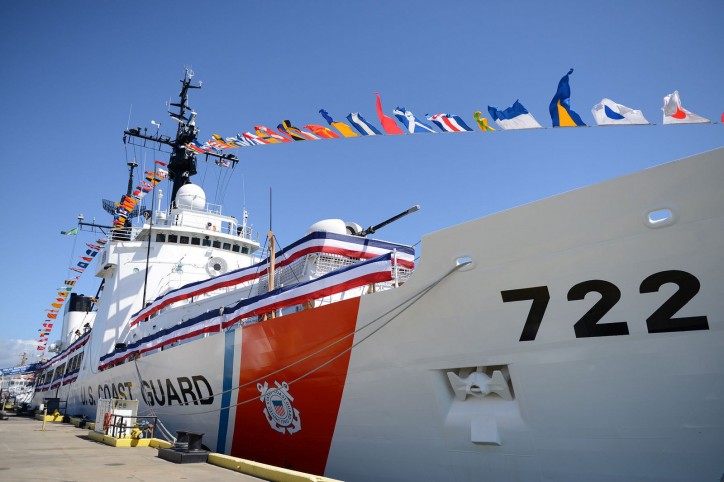The U.S. Coast Guard Cutter Morgenthau (WHEC 722), a 378-foot high endurance cutter, was decommissioned after nearly 50 years of service as part of recapitalization efforts during a ceremony at Coast Guard Base Honolulu, Tuesday.
Its nearly 50 years of service, included action in the Vietnam War, numerous major drug interdictions and law enforcement cases, and a variety of noteworthy rescues.
“The history of Morgenthau’s operations showcases the Coast Guard’s ability to carry out a diverse and important range of missions vital to the security and prosperity of our nation,” said Vice Adm. Fred Midgette, who leads the service’s Pacific fleet as the commander of Coast Guard Pacific Area in Alameda, California. “The Coast Guard must be ready to protect American security and economic interests wherever called, and recapitalizing our vessels, aircraft, boats and infrastructure has been our highest investment priority.”
U.S. Coast Guard Cutter Morgenthau in full dress at the decommissioning ceremony in Honolulu, April 18, 2017 - Image courtesy of USCG
Morgenthau, commissioned March 10, 1969, was the eighth of 12 Hamilton- class high endurance cutters built by Avondale Shipyards in New Orleans. High endurance cutters are the largest cutters, aside from the three major icebreakers and national security cutters, ever built for the Coast Guard.
Morgenthau was active in the Vietnam War, conducting underway replenishment, naval gunfire support, and patrol duties off the coast of Vietnam until relieved by a 311′ cutter in 1971.
In 1977, Morgenthau became the first cutter to have women permanently assigned, which paved the way for numerous women to serve aboard Coast Guard cutters nationwide.
In the fall of 1996, Morgenthau was the first U.S. Coast Guard cutter to deploy to the Arabian Gulf. Participating in Operation Vigilant Sentinel, Morgenthau enforced Iraq’s compliance with United Nations sanctions. Following the terrorist attacks of Sept. 11, 2001, Morgenthau participated in Operation Noble Eagle to safeguard America’s prominent port cities through closer scrutiny of maritime traffic.
“The significant legacy left in the wake of Morgenthau is evidenced not only by cutter’s history but also by the numerous former crewmembers who attended the ceremony,” said Midgette. “At the end of the day, this was simply a ship used by dedicated men and women to protect America, its people and their interests around the world. This cutter may leave our service, but the legacy of the men and women who served on Morgenthau will live on forever.”
The U.S. State Department is coordinating the transfer of Morgenthau through the Foreign Assistance Act. This act allows the transfer of excess defense articles as a grant to friendly, foreign governments.
Source: USCG

